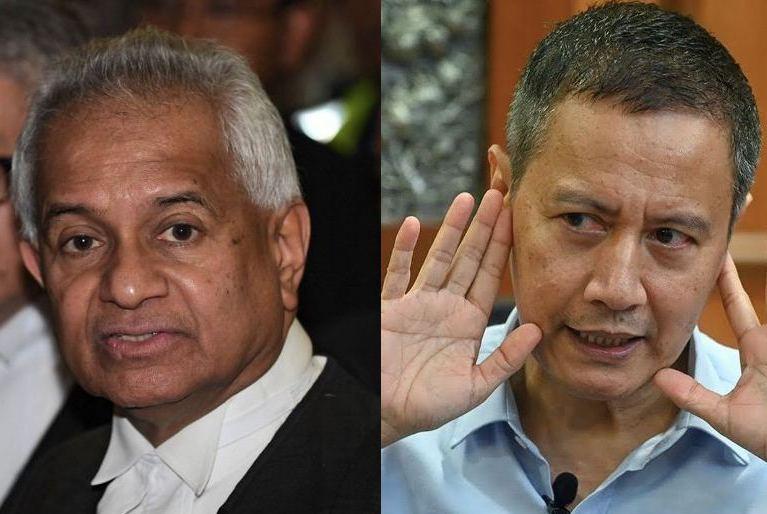Speaker Azhar questions claims by ex-AG Thomas on EC reforms
Azhar Harun says there were practical reasons for allowing the ouster clause to remain, which had received the support of others as well.
Just In
Dewan Rakyat Speaker Azhar Harun has fought back on claims against him by Tommy Thomas in a new autobiography in which the former attorney-general attacked several individuals he had worked with during Pakatan Harapan’s (PH) 22-month rule.
Thomas claimed that Azhar, who served as chairman of the Election Commision (EC) under the previous government, had been against amending laws that would allow the public to challenge the EC’s decisions during elections.
Thomas claimed that his move to abolish the ouster clause had faced resistance in the Attorney-General’s Chambers as well as from the home ministry and the Treasury.
“But the most surprising objection came from the Election Commission,” Thomas wrote in his book “My Story: Justice in the Wilderness”.
The 552-page book, which was written with the help of several politicians including DAP’s Liew Ching Tong and Syahredzan Johan, as well as former Bersih chairman Ambiga Sreenevasan and businessman Kalimullah Hassan of ECM Libra Group, is not available at bookstores although a PDF version is making the rounds on social media platforms including WhatsApp.
The ouster clause refers to a provision under Section 9A of the Elections Act, which prevents an electoral roll that has been certified from being challenged in court.
Thomas said upon hearing of Azhar’s opinion, he telephoned the lawyer who is popularly known as Art Harun.
“I was absolutely shocked when Art Harun defended the EC’s view, which he personally subscribed to, that the numerous ouster clauses in the EC laws were absolutely necessary,” he said.
“We argued for some time, but when I realised that Azhar would not shift, I terminated our telephone conversation.”
Thomas then accused Azhar of being against good governance, adding that this was shown when Azhar accepted the speaker’s post.
“One should not be surprised at his lack of support for good governance, with the openness and accountability of civil servants whose decision ought to be open to scrutiny by a court of law.”
Thomas then admitted that he did not pursue the abolition of the clause.
Azhar: I discussed with others
When contacted, Azhar told MalaysiaNow that the resistance to Thomas’ proposal to abolish the ouster clause was not his decision alone.
He also said there were several practical reasons for allowing the clause to remain.
“Chief in my mind was, what if a challenge on the electoral roll is mounted just after the writ of election is issued, or worse, after nomination day?” he said.
He said there were many operational decisions left for the EC to make on issues from localities, polling stations and number of streams to the type of banners and logos to be used.
“What if all these are challenged in court after nomination day or after publication of writ?” he asked.
Azhar questioned why Thomas had singled out the EC’s ouster clause when there were many such clauses prevalent which allow final decisions for many executive branches of the government.
He said he had always discussed the EC’s position with stakeholders including Ambiga, the former chairman of Bersih 2.0, and Wong Chin Huat, who was active in the election reforms coalition.
“I explained to them, and later to Tommy, the problems that the EC might face with the total abolishment of the ouster clause,” Azhar added.
He said in one bipartisan engagement, Petaling Jaya MP Maria Chin Abdullah had also agreed with his explanation of the need to retain the ouster clause.
“After my explanations to all those who were present, she said, ‘Ya arr, how to conduct election if it was like that!'” Azhar told MalaysiaNow.
Azhar said it was wrong to claim that he was totally against removing the right to challenge the EC, adding however that it was critical to take the middle path.
He said this includes allowing people to challenge certain matters within a certain period of time.
He said he had alternatively proposed an independent body to adjudicate election matters, saying it was a more practical solution than judicial interventions to complicate the EC’s functions.
He also showed a memo he wrote to Thomas about finding the middle ground.
“I did not refuse. I was trying to find a better solution, not a total deletion of the ouster clause giving rise to an impossibility to conduct an election,” said Azhar.
Azhar added that he viewed Thomas’ criticism of him as personal.
“To say that I totally rejected it and to connect it to my appointment as speaker is really bad of him,” he added.
Subscribe to our newsletter
To be updated with all the latest news and analyses daily.
